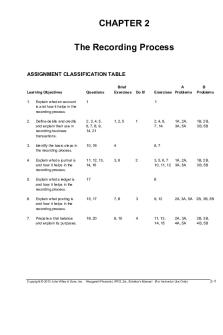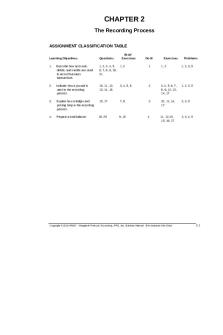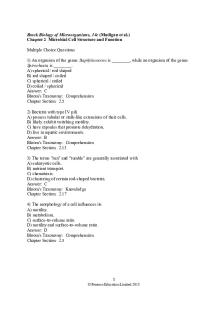Answers to CH02 - CHAPTER 2 NOTES PDF

| Title | Answers to CH02 - CHAPTER 2 NOTES |
|---|---|
| Author | William Lopez Flores |
| Course | Real Estate Finance And Investment |
| Institution | Baruch College CUNY |
| Pages | 2 |
| File Size | 89.1 KB |
| File Type | |
| Total Downloads | 26 |
| Total Views | 146 |
Summary
CHAPTER 2 NOTES...
Description
Solutions to Questions—Chapter 2 Real Estate Financing: Notes and Mortgages Question 1 Distinguish between a mortgage and a note. A note admits the debt and generally makes the borrower personally liable for the obligation. A mortgage is usually a separate document which pledges the designated property as security for the debt. Question 2 What does default mean? Does it occur only when borrowers fail to make scheduled loan payments? Default means that the borrower has failed to (1) make scheduled loan payments or (2) violated on a provision in the note or mortgage. Question 3 What is meant by mortgage foreclosure, and what alternatives are there to such action? Foreclosure involves the sale of property by the courts to satisfy the unpaid debt. Alternatives: 1. Restructuring the mortgage loan 2. Transfer of the mortgage to a new owner 3. Voluntary conveyance of the title to the mortgagee 4. A “friendly” foreclosure 5. A prepackaged bankruptcy Question 4 What does it mean when a lender accelerates on a note? What is meant by forbearance? The acceleration clause gives the lender the right or option to demand the loan balance owed if a default occurs. Forbearance by the lender allows the borrower time to cure a deficiency without the lender giving up the right to foreclose at a future time. Question 5 Can borrowers pay off part, or all, of loans any time that they desire? No. In general, prepayment is a privilege not a right. In cases of residential/consumer loans made by federally related lenders, this option is usually provided to borrowers. In commercial real estate loans it is not. Question 6 What does “nonrecourse” financing mean? The borrower is not personally liable on the note. The lender may look only to the property (security) to satisfy the loan in the event of default. Question 7 What does “assignment” mean and why would a lender want to assign a mortgage loan? Assignment gives the lender the right to sell or exchange a mortgage loan to another party without the approval of the borrower. Question 8 What is meant by a “purchase-money” mortgage loan? When could a loan not be a purchase-money mortgage loan? 1
Purchase money means funds from the loan will be used to purchase a property. It will not provide funds for other uses such as could be the case with a refinancing. Question 10 What does a deficiency judgment mean? If default occurs and the property is sold, if the dollars from the sale is not enough to pay off the loan balance, the borrower is liable for the difference. Question 14 Explain the difference between a buyer assuming the mortgage and a buyer taking title subject to the mortgage. If the purchaser acquires the property “subject to” the existing debt, he does not acquire any personal liability for the debt. When a mortgage is assumed the original borrower may be released from any obligations to the lender. Question 15 What dangers are encountered by mortgagees and unreleased mortgagors when property is sold subject to a mortgage? The mortgagor will be responsible if the person acquiring the property subject to the mortgage defaults. In turn, if the original mortgagor then defaults, the bank will have to foreclose on the property which may not be worth what is left to pay on the mortgage.
2...
Similar Free PDFs

Ch02 - Chapter 2
- 12 Pages

Answers to CH04 - CHAPTER 4 NOTES
- 10 Pages

Ch02 Testbank - Test Bank, Chapter 2
- 76 Pages

Chapter 2 Answers to Review Problems
- 32 Pages

Ch02
- 66 Pages

Ch02
- 60 Pages

Ch02
- 18 Pages

Chapter 10 answers - notes
- 47 Pages

Chapter 6 answers to questions
- 9 Pages

Intro to theatre chapter 2 notes
- 2 Pages
Popular Institutions
- Tinajero National High School - Annex
- Politeknik Caltex Riau
- Yokohama City University
- SGT University
- University of Al-Qadisiyah
- Divine Word College of Vigan
- Techniek College Rotterdam
- Universidade de Santiago
- Universiti Teknologi MARA Cawangan Johor Kampus Pasir Gudang
- Poltekkes Kemenkes Yogyakarta
- Baguio City National High School
- Colegio san marcos
- preparatoria uno
- Centro de Bachillerato Tecnológico Industrial y de Servicios No. 107
- Dalian Maritime University
- Quang Trung Secondary School
- Colegio Tecnológico en Informática
- Corporación Regional de Educación Superior
- Grupo CEDVA
- Dar Al Uloom University
- Centro de Estudios Preuniversitarios de la Universidad Nacional de Ingeniería
- 上智大学
- Aakash International School, Nuna Majara
- San Felipe Neri Catholic School
- Kang Chiao International School - New Taipei City
- Misamis Occidental National High School
- Institución Educativa Escuela Normal Juan Ladrilleros
- Kolehiyo ng Pantukan
- Batanes State College
- Instituto Continental
- Sekolah Menengah Kejuruan Kesehatan Kaltara (Tarakan)
- Colegio de La Inmaculada Concepcion - Cebu





